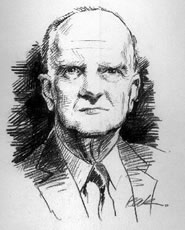Humphrey McQueen
Tom’s friendship and his company brought out the best in many
of us. He was surprised to be told that his employer Neville Wran had
a strong line of expletives and perplexed when informed that the premier
of New South Wales was not the only person who adjusted his behaviour
in the Fitzgerald presence.
He remained a gentleman of his generation who would walk the floor at
night with a sick child but for whom the domestic economy remained a mystery.
He taught himself to stack the washing-up machine, burn toast and boil
water for instant coffee but never surrendered his amazement at my ability
to jiggle a teabag.
…Whether Fitzgerald had memorised all Shakespeare’s plays
is uncertain but he could pick up from any cue dropped in conversation.
In the Air Force, his capacity for apt quotation had earned him the sobriquet
of ‘Shakespeare’s Ghost’. He delighted in the bawdy
for its own sake as well as for Shakespeare’s use of it to deepen
his profoundest observations. Shakespeare’s attainments he considered
to be unsurpassed, though not without fault. How could Hamlet, after communing
with his father’s ghost, soliloquise on ‘The undiscovered
country from whose bourne/ No traveller returns’? Claims that the
plays were written by Ben Jonson or the Earl of Oxford, Fitzgerald spurned
as snobbery. Why should a butcher’s son not be a genius? demanded
the milkman’s lad. His other dislike was for biographers who used
the playtexts as evidence for the life or opinions. The sure facts of
Shakespeare’s life could fit onto one sheet of paper. The rest was
problematical. That attitude steered Fitzgerald’s biographical essays.
…His disaffection for the Whitlam debacle spurred him towards the
preparation of a life of John Curtin. As well as his having been Fitzgerald’s
war-time prime minister, Curtin appealed as a leader who embodied two
essentials lacking in Whitlam. The first was a sense of fellowship with
Caucus. The second was an understanding of the economy – for if
that went awry nothing else could be set to rights. Fitzgerald had waited
twenty years to achieve social, political and cultural change only to
have too many of his and the nation’s hopes mutilated through ignorance
and arrogance. [4]
Although Fitzgerald’s career has been in economics, he has never
supposed that their study or application was all that life had to offer.
For him, the billion years before human economics began, the marvels of
poetic creation and composure in the face of death come closer to determining
significance. Yet he knows that a society or government that lets its
economy go to the bad will not be able to put much else to rights. He
is rational about economics, without being an economic rationalist.
‘Dissenting’ is the term Fitzgerald uses to describe his
position against conventional economic doctrine; yet he also places himself
in a different line of orthodoxy, one that includes Joseph Schumpeter,
Maynard Keynes and Paul Samuelson – and does not deny entry to Adam
Smith. Fitzgerald asks how much of Smith today’s worshippers of
the ‘free market’ have read, before citing several passages
that would discomfort those still honest enough to take in their master’s
meaning.
Fitzgerald is attracted to this tradition because its practitioners have
attended to the changing realities and provisional conclusions that are
the stuff of making and spending, whereas the current orthodoxy is dominated
by dogmatic abstraction, spuriously legitimated by second-rate mathematics.
Algebraic ‘symbols tend to give an aura of precision and finality
in some readers’ minds, when in fact they’re promoting evasion
of the logical complications’. [5]
Sydney Morning Herald obituary for Tom Fitzgerald
He was 'one of the greatest journalists of his time', said Mr Harry
Kippax, former news editor and drama critic of the Herald.
Professor Ken Inglis, Professor of History at the Australian National
University, said yesterday 'it was greedy to want more from someone
who had given his country and culture so much'.
'But many of us had just assumed he would go on forever, offering indispensable
wisdom about our condition in immaculate prose. What I’ll miss most
though, is his simple goodness.'
Mr V.J. Carroll, former editor-in-chief of the Herald, said
of Mr Fitzgerald: 'At a time when a lot of our political and economic
wisdom is based on survival of the fittest – ‘every man for
himself,’ said the lion as he danced among the chickens –
Tom was a real lion whose concern was always for the chickens.' [6]
Footnotes
1. Inglis, K, 1989, Nation:
The Life of an Independent Journal of Opinion, 1958 – 1972,
Melbourne University Press
2 Inglis, K, 1989/90, ‘Nation’s
Strength’, Independent Monthly, December 1989 – January
1990; and Inglis, k, 1988, ‘Eight million words of Nation’, Australian Society, September 1988
3. Ryan, P, 1991, ‘Lashing
the taboos of Treasury’, The Age, 9 February 1991
4. McQueen, H, 1993, A human
face of economics and an emperor of ice cream, 24 Hours, April
1993
5. McQueen, H, 1990,‘On
economics, life, love and barnacles’, 24 Hours, November 1990
6. Valerie Lawson,
‘A ‘lion’ of Australian journalism dies’, The
Sydney Morning Herald, 27 January 1993 |


